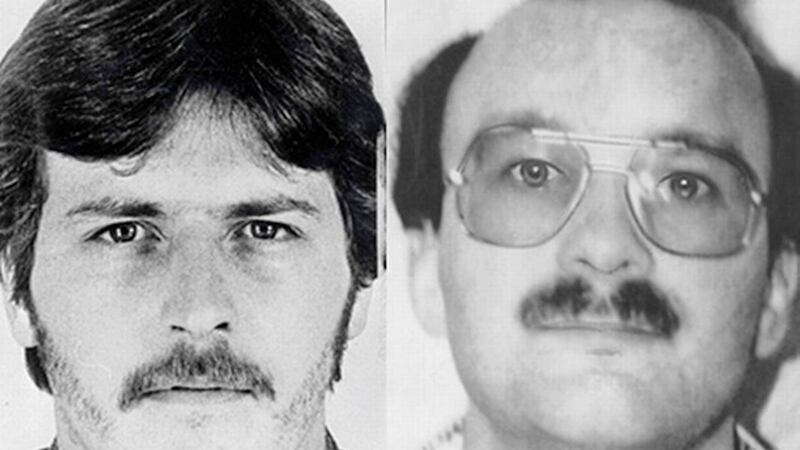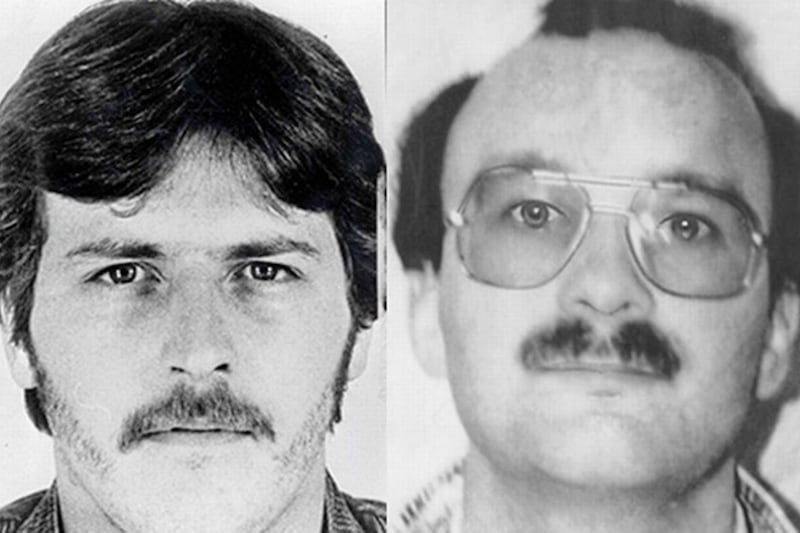British MPs demanded to withdraw from Ireland to let "the Irish get on with butchering each other" in response to the killing of two British army undercover corporals at an IRA funeral in west Belfast, according to confidential files.
Newly declassified records, released under the 30-year rule, show the murders of Derek Wood and David Howes of the Signals Regiment provoked outrage among MPs at Westminster.
The two soldiers were surrounded by a crowd when they drove into the funeral cortege of an IRA man who had been killed by loyalist Michael Stone days earlier.
The confidential note, entitled "mood at Westminster", was written by Irish Embassy official Richard Ryan after he spoke to some 20 MPs of "all shades" days after the murders in March 1988.
The diplomat said many MPs who did not take an active interest in Irish affairs became "puffed with outrage and conviction" about doing something in response to the killings.
He said suggestions ranged from demands for a tougher and revised policy of policing funerals to a demand for internment throughout Ireland and, in "more cases than previously", to a demand to setting a date for withdrawal from Ireland "in order to let the Irish get on with butchering each other".
Mr Ryan also said people across Britain wrote to their MPs demanding greater action against terrorists.
The two plain-clothed British soldiers inadvertently drove into the path of the funeral before mourners pulled them from the car and were beaten before being shot dead by members of the IRA.
The murders happened days after the funerals of the three IRA members who were shot dead by the SAS in Gibraltar.
Mr Ryan said after meeting backbenchers at Westminster, he was struck by their exasperation and anger "without any proper sense of how to ventilate it" while there was a resurgence of "frustrated patience" with Ireland.
"The complexity of the issues elude their instinctual approach to policy questions, that of self-interested pragmatism and this further fuels their primary response to events such as last Saturday's," he added.
"It has to be said that no amount of violence toward the UDR, the RUC and Northern Irish or Irish civilians of any religious persuasion could come anywhere near provoking the same reaction in Britain to Saturday's killings – and the sort of killings they were – of their own English soldiers."
He later said there was a risk the Anglo-Irish relationship and the Agreement may be "caught in the net" when MPs look for the reasons behind the murders.
Days after the killings, the Secretary of State Tom King, made a speech to the House of Commons in which he described the "horrific events" that shocked the world.
In a separate memo from Mr Ryan following a meeting with Conservative MP Edward Leigh, he said the Prime Minister Margaret Thatcher was left "very distressed and very angry" by the soldiers' murders.
Mr Leigh indicated that MPs held special meetings to call for support for "much tougher and direct action" by the SAS and other special units against terrorists.
"He stressed several times that he was not exaggerating the mood generally", Mr Ryan wrote.
Mr King told Mr Leigh during a meeting they had reason to believe the IRA was "planning a serious offensive", however, he did not elaborate further than this.
Read More
- UVF 'had secret talks with IRA which discussed federal Ireland'
- John Hume concerned by release of republican prisoners from Portlaoise after IRA ceasefire
- Bill Clinton was 'more forthcoming' to nationalists than British wanted
Read More
- Gerry Adams was 'dispensable' and 'no Mandela', Ken Maginnis told Bill Clinton adviser
- Unionists 'felt nationalists had benefited from IRA violence'
- Withdrawal of funding from Irish language group 'sparked huge row'
Read More
- Row over planned restoration of Co Armagh birthplace of Orange Order
- Orange Order berated Sir Patrick Mayhew over 'cannibals' remark
- Ian Paisley Jnr 'wanted Stormont government which could negotiate with Republic'
Read More
- Mary Robinson's 1993 meeting with Gerry Adams 'angered British government'
- British government 'repeatedly tried to block Gerry Adams's US visa in 1994'
- Records reveal British criticism of Republic's response to Gibraltar deaths
Read More
- Thatcher 'accused Irish government of doing nothing' over suspected IRA priest
- Irish government queried bulk postal discount for Sinn Féin over IRA funding fears
Read More
- Secretary of state Tom King walked out of meeting after row with SDLP over devolution
- Margaret Thatcher said Garda was 'not a highly professional police force'
- Farm security gates at Irish border sparked allegations of discrimination against Catholics



